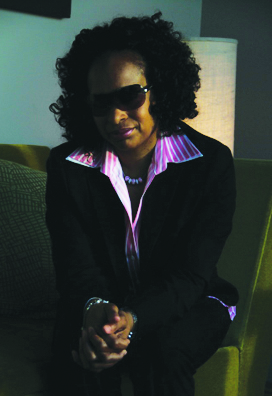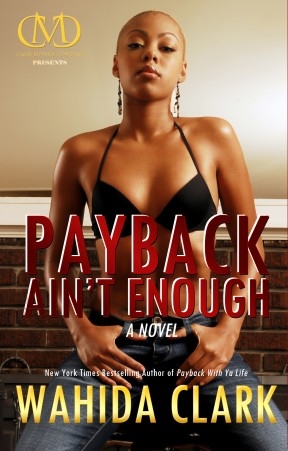Author Wahida Clark has been one of the most recognizable names in publishing for the last decade. As a leader in innovation in Street-Lit she has thrilled readers with a number of books, while opening doors for other writers under her company Wahida Clark Publishing. Clark’s hustle and determination since being released from prison in 2007 was recognized by Birdman in 2011, landing her a spot shared by only a handful of authors on the Cash Money Content imprint. Her most recent release, Payback Ain’t Enough, is her 2nd release under Cash Money Content and her 11th overall. We caught up with her recently to talk about what separates her from other writers, her Payback series and her future plans for dominating literature and film. The Cream Always Rises to the Top… And Wahida Clark is definitely the cream in this publishing industry.
Parlé Magazine: Let’s start with the latest project, Payback Ain’t Enough. Tell the readers about that.
Author Wahida Clark: Payback Ain’t Enough is book number 11, number 2 under Cash Money Content. It’s about a hood double love triangle, weaved with deception, revenge and scandal. I take the readers through the concrete jungles of Detroit where of course they meet the usual suspects, the drug dealers, the hustlers, the jealous women, the scorned women and its just a roller coaster of a read.
Parlé: You grew up in Jersey, born and raised in Trenton, how did growing up there affect the stories that you tell now?
Wahida: The hoods in Trenton are the same as the hoods in Newark, Detroit, Miami, the hoods are all the same. Of course as you come up, you meet colorful people, different relatives and what have you that leave impressions on your mind so all of that does affect how I write, plus my imagination is just crazy. Just like Hip-Hop artists rap about what they see and what they’ve experienced, its the same as street-lit, we write what we’ve seen, what we’ve lived.
Parlé: Its common knowledge that you were incarcerated, what was the main factor while inside to start working on these books. Because I know a lot of people want to do it and say they’re going to do it, but still come out with nothing.
Wahida: I had no choice in the matter. I had a 10 and a half year sentence. About a year into my sentence I called my niece and told her to send me some money. She said, ‘Wahida, we’ll see what we can do.’ I said, ‘What?!’
Mind you, it cost money to be in prison. You have to pay in the Feds. You have to pay to use the washing machine, you pay to use the dryer. You have to buy your own soap powder, you buy your own underwear, deodorant, soap. It costs money to be in prison. Then I had two teenage daughters living at home, my husband, he was locked up too. So, ‘we’ll see what we can do?’ No, I need money now. I had still take care of my daughters and I was thinking about the future. What was I going to do when I stepped out the gates in ten and a half years. I had to set up a foundation. It’s strange because once you set those wheels in motion, the universe works with you. I was working in the law library and this woman who came to the prison, on the streets her job was a literary agent. And she had asked the Warden can she give a class on publishing and creative writing. So of course I took the class. At the same time while working in the law library I picked up this XXL magazine and it had Shannon Holmes in it. And the article said that he had written a book while he was in prison. Here I am sitting in the law library and I see all the books on the book shelves, so I start visualizing my name, Wahida Clark on the spines of all the books on the book shelves. And that’s actually when I had my light bulb moment. I said, I’ma write me a book. I started writing, the lady came in, the literary agent, did her class. I didn’t know I could write, I didn’t know how to write. I took the class and here I am, book number 11.
But I want to say to them brothers and sisters in prison, if they don’t write it in prison, 9 times out of 10 its not going to get wrote. Out here its a whole ‘nother ball game. It’s too much going on, too much distractions for you to write, so while they inside they need to at least come out with 10 books in their pockets.

Parlé: How do you do it though, in terms of time management? I hear you writing books in 3 to 4 months. I’ve never heard anything like that.
Wahida: Its crazy. My agent tells me, ‘Wahida, you the only one that write the way you write.’ All the other writers, they write like they have some sense, all year long. Me, I’m like okay, deadline is September, so let’s see, July, I need to get writing. I usually crunch and just knock it out.
Parlé: But you’ll already have the concept ready to go?
Wahida: No. And that’s crazy cause it makes it so much harder. Its excruciating, like giving birth to a baby when I write a book. Its so much much pressure cause I wait til the last minute and I don’t even have an outline. So its rough, but it works for me somehow.
Parlé: You have the Thug series and you have the Payback series. Of course fans love both but what’s the biggest difference between the two?
Wahida: The Thug series, the relationships between the males and the females are more solid, more romantically inclined. Whereas the Payback series is more drama, hard hitting, hood and street. The Thug series is hood and street, but its relationship based. My readers love the relationships between the male and female characters in the Thug Series.
Parlé: Do you have a favorite of the 2, to write?
Wahida: Now, why you gonna ask me that? (Laughs) I really enjoy writing the Thug series so I would have to say the Thug Series.
Parlé: And that’s the first one you wrote, correct?
Wahida: (Nods) That’s the first one.
Parlé: What do you hope people get from your books?
Wahida: In all my books, in the story line I show that every deed has its consequences no matter what you do, it comes back to you, be it good, be it bad. What goes around, comes around. That’s my main themes of the books.
Parlé: We already talked about people who are locked up, but what advice do you have for people on the street who hope to put out a book?
Wahida: Editing. You can’t just write a book and say this is it and put it out. It needs to get edited. Writing is rewriting and going over it over and over again. And then you gotta have hustle. This book game is a hustle. Once you write the book, your work is just beginning. You have to get out there to get your name known and push your book cause the book isn’t going to sell itself. Your publishing company is only going to do so much. You have to really push your own product. If you not ready to get out there and hustle and grind then you might as well not even write the book. Cause you gonna have something just sitting there. To me that’s a waste of time, you gonna go through the trouble of writing the book, why not make ways and really make noise with your product.
Parlé: Of course you’re signed to Cash Money Content but prior to Cash Money you were still one of the biggest names in publishing, you were still one of the most prominent authors out there. What kept you out there on such a large level?
Wahida: I owe everything to my readers. And my obsession is making each book better than the previous one. That’s why I’m still relevant in the game because each time I come out I try to make sure that book is better than the last. I can’t fall off.
Parlé: I’ve seen videos of Birdman talking about his love for your books, but I’ve never heard you talk about Hip-Hop or what your love for Hip-Hop is. Do you listen?
Wahida: Of course. My characters were birthed on Hip-Hop. I write listening to Hip-Hop. Hip-Hop gets me amped, gets me motivated. Hip-Hop is the art of story telling, writing Street-Lit is the art of story telling. It’s the same.
Parlé: Was there ever a point where you had a Hip-Hop career going?
Wahida: N ot at all. I wish I could. I probably think I can rap when I’m listening to Hip-Hop and rapping along, but not at all. I rather let them do what they do.
Parlé: At the end of the road, where do you hope to see Wahida Clark and your legacy in publishing?
Wahida: Definitely the movie game. We need to definitely create our own Black Hollywood. Also, widening the audience to Street- Lit. Its like we’re pigeon-holed to that one corner but Street-Lit, we have intricate plots. It’s suspenseful. The characters want to live happily ever after. You know, we write the same stories that the mainstream write, but we just base it on hoods. So I just want to see the genre expand more.
Parlé: Hip-Hop and Street-Lit are one in the same and with that in mind, I think there are sooo many rappers who pop up in the game with weak material that it decreases the overall market, do you feel like its the same with Street- Lit and all the authors.
Wahida: Absolutely, but the cream always rises to the top. Those who create the legacies in Hip-Hop, they stayed on their grind, they made sure their next product is better than their previous product so its the same thing.
Parlé: You also have your own publishing company…
Wahida: Correct, Wahida Clark Publishing Company. I have 14 authors and 18 titles in stores. All of my authors are incarcerated, except for 3 currently.
Parlé: How do you go about deciding who deserves a shot?
Wahida: The story. The story speaks for itself. Because Wahida Clark is a brand, Wahida Clark is on it, its a brand. We have to be up to Wahida Clark standards. I just like that fast paced, well written and I like the hungry authors.

Parlé: To bring it back to the latest book, for readers who might’ve missed the earlier books in the Payback series but want to get in on Payback Ain’t Enough, what should they expect?
Wahida: Payback Ain’t Enough takes them through the concrete jungle of Detroit. I never took my readers there before, so if you never been to Detroit, you’re going to love this one here.
Parlé: Were you in Detroit when you decided to write about it?
Wahida: Not at all. But during my incarceration, out of everybody I met, the Detroit people were the most realest. They’re a different breed. Memphis is a different breed as well, they stood out but Detroit and Memphis stood out.
Parlé: Do you know what’s next for Wahida?
Wahida: What’s next for Wahida, getting this screen play written cause Birdman keeps sweating Wahida. He’ll send me a text that just says “SCRIPT.”
Parlé: Are you going to take 3, 4 months with that too?
Wahida: Nope. Nope. But I think I’ma get a big name to assist with it.
Parlé: Any final thoughts you want to get out there?
Wahida: Shout out to Parlé Magazine. Shout out to my readers who keep supporting me and a special, special shout out to Cash Money Content for allowing me to bring my vision to their company and allowing me to do me.
Image by Christian Ortiz for Parlé Magazine
Also Check Out:
Luna Charles – Authoring Inspiration For Women Everywhere
Author Lendy Demetrius Returns To Storytelling With Urban Tale
Staci Sherri – Designing A Life of Fashion
The Teacher Is In – The Brian McKnight Interview

